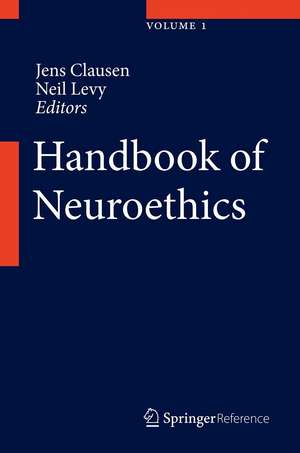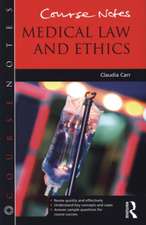Handbook of Neuroethics
Editat de Jens Clausen, Neil Levyen Limba Engleză Hardback – 28 oct 2014
Preț: 4517.88 lei
Preț vechi: 5509.60 lei
-18% Nou
Puncte Express: 6777
Preț estimativ în valută:
864.59€ • 901.51$ • 718.56£
864.59€ • 901.51$ • 718.56£
Carte disponibilă
Livrare economică 28 februarie-14 martie
Preluare comenzi: 021 569.72.76
Specificații
ISBN-13: 9789400747067
ISBN-10: 9400747063
Pagini: 1000
Ilustrații: XXXII, 1850 p. 31 illus., 20 illus. in color. In 3 volumes, not available separately.
Dimensiuni: 155 x 235 x 119 mm
Greutate: 3.11 kg
Ediția:2015
Editura: SPRINGER NETHERLANDS
Colecția Springer
Locul publicării:Dordrecht, Netherlands
ISBN-10: 9400747063
Pagini: 1000
Ilustrații: XXXII, 1850 p. 31 illus., 20 illus. in color. In 3 volumes, not available separately.
Dimensiuni: 155 x 235 x 119 mm
Greutate: 3.11 kg
Ediția:2015
Editura: SPRINGER NETHERLANDS
Colecția Springer
Locul publicării:Dordrecht, Netherlands
Public țintă
ResearchCuprins
Addiction and Neuroethics.- Brain Research and Ethics.- Developmental Neuroethics.- Ethical Implications of Brain Imaging.- Ethical Implications of Brain Stimulation.- Ethical Implications of Brain-Machine Interfacing.- Ethical Implications of Cell and Genetherapy.- Ethical Implications of Sensory Prostheses.- Ethics in Neurosurgery.- Ethics in Psychiatry.- Feminist Neuroethics.- Foundational Issues in Cognitive Neuroscience.- History of Neuroscience and Neuroethics.- Moral Cognition.- Neuroanthropology.- Neuroenhancement.- Neuroethics and Identity.- Neurolaw.- Neuromarketing.- Neuroscience, Free Will, and Responsibility.- Neuroscience, Neuroethics, and the Media Neurotheology.- Weaponization of Neuroscience.- What Is Neuroethics?.
Recenzii
“This is a comprehensive reference work on neuroscience, neurology, neurosurgery, morality, animal research, human subject research. … I highly recommend this book for ethicists, neurologists, neurosurgeons, philosophers, and students in Ethics Research.” (Joseph J. Grenier, Amazon.com, May, 2015)
Notă biografică
Jens Clausen is head of the neuroethics group at the Institute for Ethics and History of Medicine, University of Tübingen and managing director of the Clinical Ethics Committee of the University Hospital Tübingen. He also is a member of the Center for Integrative Neuroscience (CIN) and the research ethics commission. His research focuses on ethical and anthropological implications of modern neurosciences with special respect to brain technological devices, enhancement and regenerative medicine. His most recent publication in the field of Neuroethics is a double special issue on ethical aspects of neurotechnologies published in Springer’s journal Neuroethics Vol. 6 No. 3, 2013.
Neil Levy is an Australian Research Council Future Fellow, based at the Florey Institute of Neuroscience and Mental Health, Melbourne, Australia. He works mainly on questions at the intersection of the sciences of the mind and ethics, as well as free will. His most recent books are Hard Luck (Oxford UP, 2011) and Consciousness and Moral Responsibility (Oxford UP, 2014). He is editor-in-chief of the journal Neuroethics.
Neil Levy is an Australian Research Council Future Fellow, based at the Florey Institute of Neuroscience and Mental Health, Melbourne, Australia. He works mainly on questions at the intersection of the sciences of the mind and ethics, as well as free will. His most recent books are Hard Luck (Oxford UP, 2011) and Consciousness and Moral Responsibility (Oxford UP, 2014). He is editor-in-chief of the journal Neuroethics.
Textul de pe ultima copertă
Neuroethics – as a multi-disciplinary and inter-disciplinary endeavor – examines the implications of the neurosciences on human beings in general and on their self-understanding and their social interactions in particular. The range of approaches adopted in neuroethics includes but is not limited to historical, anthropological, ethical, philosophical, theological, sociological and legal approaches. Based on the study of neuroscientific developments and innovations, examined from different angles, this Handbook provides a comprehensive overview of the international neuroethical debate, and offers unprecedented insights into the impact of neuroscientific research, diagnosis, and therapy.
This Handbook deals with a plethora of topics divided into in three parts: the first part contains discussions of theories of neuroethics, identity, free will, as well as other philosophical considerations. The second part is dedicated to issues involved in current and future clinical applications of neurosciences, such as brain stimulation, brain imaging, prosthetics, addiction, and psychiatric ethics. The final part deals with neuroethics and society and includes chapters on neurolaw, neurotheology, neuromarketing, and enhancement.
This Handbook deals with a plethora of topics divided into in three parts: the first part contains discussions of theories of neuroethics, identity, free will, as well as other philosophical considerations. The second part is dedicated to issues involved in current and future clinical applications of neurosciences, such as brain stimulation, brain imaging, prosthetics, addiction, and psychiatric ethics. The final part deals with neuroethics and society and includes chapters on neurolaw, neurotheology, neuromarketing, and enhancement.
Caracteristici
Offers a broad thematic spectrum with comprehensive overviews of all topics covered by the term neuroethics Contains more than 20 sections with in depth introductions and discussions of key issues Expertly assembled bibliographies for each section Includes supplementary material: sn.pub/extras


















